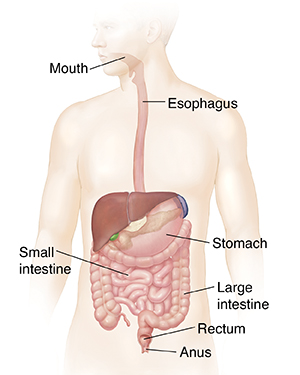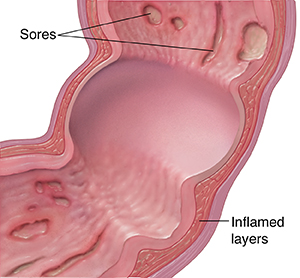What is Crohn's Disease?
What Is Crohn’s Disease?

Symptoms of Crohn’s disease
Belly pain and cramping
Urgent need to move bowels or sensation of incomplete evacuation
Constipation
High fever and chills
Loss of appetite; possible weight loss
Bloody or persistent diarrhea
Nausea or vomiting
Joint pain
Skin rashes and ulceration
Eye inflammation
Your treatment choices
Your healthcare provider will discuss your treatment choices with you. They may include medicines, lifestyle changes, surgery, or a combination of these. Treatment helps you stay as active as you want to be. Keep in mind that Crohn’s is considered chronic. That means it usually can’t be cured. But treatment may ease symptoms. And even though you have a chronic illness, you can still live a full life.
Medicines
Certain medicines can help your symptoms. These may include:
Medicines to control your body's immune system, such as 6-mercaptopurine or azathioprine
Corticosteroids (for short-term, but not maintenance treatment) to help reduce inflammation
Antibiotics to fight bacteria, if there are infectious complications
Biologics (anti-TNF)
Lifestyle changes

Certain foods can worsen symptoms. You may need to change what you eat. Avoid any food that makes your symptoms worse. These foods vary from person to person. But high-fiber foods (such as fresh vegetables) and high-fat foods (such as dairy products and red meat) cause symptoms in many people. Keep track of foods that cause you problems.
To a lesser degree, stress may possibly worsen symptoms. Reducing stress may help. Techniques like relaxation exercises, medicine, and deep breathing can help you control stress. Your healthcare provider may be able to tell you more about these.
If surgery is needed
Surgery may help control Crohn's, relieving digestive tract symptoms. Surgery can remove a severely affected part of the digestive tract. If this is a choice for you, your healthcare provider can give you more information. Keep in mind that surgery is not a cure for Crohn's. You will need to continue to closely follow up with your healthcare provider after surgery for more treatment and testing recommendations
Updated:
March 21, 2017
Sources:
Clinical manifestations, diagnosis and prognosis of Crohn disease in adults. UpToDate
Reviewed By:
Adler, Liora C., MD,Fraser, Marianne, MSN, RN,Image reviewed by StayWell medical illustration team.